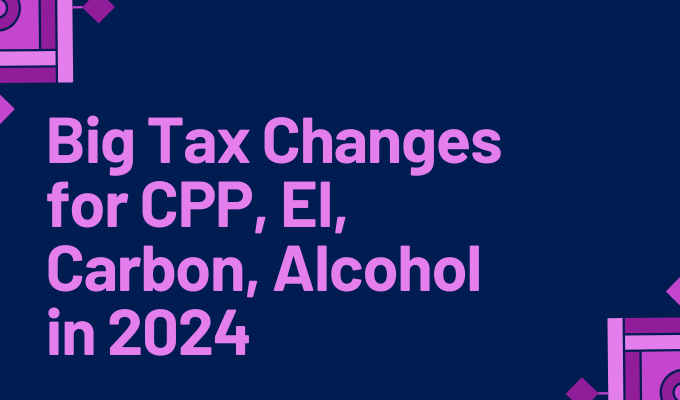Please stay on our portal and keep scrolling down this article on Big Tax Changes for CPP, EI, Carbon, Alcohol in 2025: Latest News and Updates.
Big Tax Changes Canada
In 2025, there will undoubtedly be changes to the tax code that will have an impact on businesses of all sizes, from small start-ups to multinational conglomerates. The key tax changes for 2025 were highlighted in the Canadian Taxpayers Federation’s annual New Year’s Tax Changes report, which was issued in March 2023.
The various tax adjustments across Canada are highlighted in this yearly tax report. This includes increases to the maximum pensionable and insurable wages, as well as additional federal taxes like as the growing payroll, carbon, and alcohol taxes, and a second tax under the Canada Pension Plan.
The majority of Canadians will be impacted by the following Big Tax Changes Canada in 2025, which we have listed below. These figures provide projections for increased obligatory payments to Employment Insurance and the Canada Pension Plan. It will also pay for hikes in the alcohol and carbon fees.
Big Tax Changes for CPP, EI, Carbon, Alcohol in 2025
CPP
The CPP’s maximum pensionable earnings are set to rise this year by the CRA, which will have an immediate impact on the cap on contributions and benefits.

A raise is planned in the maximum pensionable earnings that are subject to CPP tax. The required contribution for businesses and workers in 2025 is $3,867. For both parties, this means an increase in taxes of $113 (for those making $68,500 or more). A second CPP tax, referred to as “CPP2,” will also be imposed starting in 2025.
With a maximum tax amount of $188 in 2025, CPP2 is applicable to income ranging from $68,500 to $73,200. Up to a new level of $73,200, CPP2 essentially amounts to an extra tax on income that exceeds the first CPP taxable income. As a result, the total CPP tax for people making $73,200 or more will be almost $4,055, which represents a $301 (CPP + CPP2) increase overall in 2025.
EI
This year, there will be a significant shift in Employment Insurance (EI) as well, with a rise in the maximum insurable wages and the premium rate. In 2025, both the maximum insurable wages and the EI tax rate are expected to rise.
Employee contributions to EI will now be $1,049, while employer contributions will be $1,469 as a result of this modification. For those making $63,200 or more per year, this means that employers will pay an extra $66 in EI taxes and employees will pay an additional $47.
If an employee makes $73,200 or more in 2025, their combined federal payroll taxes (CPP and EI tax) will be $5,104. Employers would also be required to pay $5,524.
The increased demand for EI coverage prompted this modification, which might provide stronger security for workers in erratic employment markets. It also implies that employees’ salary deductions for EI will be somewhat higher. But if you do end yourself unemployed, it does mean you’ll have greater assistance.
Carbon Tax
Canada’s carbon price will rise from $65 to $80 per tonne in 2025 as the country continues on its road to achieve net-zero emissions by 2050.
Beginning April 1, 2025, the federal carbon tax will rise to more than 17 cents a liter of gas and 15 cents per cubic meter of natural gas. The Parliamentary Budget Officer estimates that even after the refunds, the average household will still pay between $377 and $911 for the carbon tax in 2025–25.
Although the greater carbon tax may benefit the environment in the long run, it will probably result in higher fuel prices overall, which will affect everything from the cost of products and services to your daily commute as transportation expenses rise.
Alcohol Tax
The year 2025 will see a discernible increase in the excise taxes on alcoholic drinks, such as wine, spirits, and beer. Customers may have to pay a little bit extra for their weekend beer or occasional glass of wine as a result.
On April 1, 2025, the tax on alcohol will rise by 4.7%. Currently, taxes make up over 50% of the cost of beer, 65% of the cost of wine, and more than 75% of the cost of spirits. Next year, the tax boost will cost Canadians about $100 million.
This alcohol tax rate rise is a reaction to concerns about public health as well as income creation, as heavy alcohol use is associated with long-term health hazards that drive up government health care expenses.
Final Discussion
Since the full consequences may take decades to manifest, younger workers will gain the most from these tax reforms, which are part of a larger goal to boost retirement support for Canadians, according to The Canadian Press.
With this we are putting a full stop to this post on Big Tax Changes for CPP, EI, Carbon, Alcohol in 2025.
